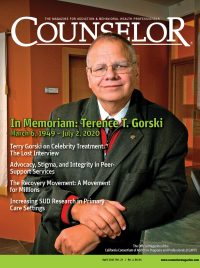Share

A hot topic has arrived in substance use disorder (SUD) counseling: trauma-informed treatment. With the advent of medical model treatment, evidence-based practices (EBP) like trauma-informed treatment are becoming normal practices to improve client outcomes. The current issue is understanding the fundamental frameworks of trauma-informed treatment and its application within the treatment arena.
While the practice itself is not new, there seems to be some confusion between direct trauma services and trauma-informed treatment. The first concept consists of direct services delivered, including an evidence-based curriculum, and the second entails a culture created and fostered within the agency. However, there are promising practices that can help providers reach their goal of becoming comprehensive, trauma-sensitive, and person-centered programs.
SUD and Trauma Statistics in the United States
Substance use and traumatic experiences have a uniquely correlated relationship. Approximately 80 percent of women seeking treatment for SUDs in the United States have a reported history of sexual or physical abuse during their lifetime and tend to have high relapse rates (López-Castro, Hu, Papini, Ruglass, & Hien, 2015). Men are said to range between 43 and 92 percent (Wolff et al., 2015), while the LGBTQ2IA+ population has far higher rates of trauma than their heterosexual counterparts (Stenersen et al., 2019). It is also indicated that one major contributor to the higher rates of interpersonal trauma is due to multiple victimizations of crimes based on individuals’ sexual orientation or identification. While research suggests a need for the practice and its effectiveness, trauma-informed treatment remains largely unmet within the SUD population.
Trauma-Informed Curriculum vs. Trauma-Informed Treatment
As an auditor assisting with oversight in my county’s Drug Medi-Cal-Organized Delivery System (DMC-ODS), a common misperception observed within our network of care is that trauma-informed treatment is merely a curriculum to address individuals’ experiences with physical, mental, and emotional abuse. Trauma-informed treatment is an approach to treatment and a theoretical framework used as a guide to assist counselors in selecting and adapting interventions in working with their clients. Further, it demonstrates concern and empathy for clients’ distress resulting from traumatic life experiences (Tseris, 2019). The emphasis is placed on understanding the trauma to enable counselors to identify, to adapt, and to provide ongoing support, rather than a stand-alone educational component to treatment.
Part of trauma-informed treatment may include curriculum in addition to the practice itself. An evidence-based curriculum can contribute to better client outcomes when implemented as intended and with proper staffing and training. Trauma-informed curriculum is a valuable tool in providing services to address the needs of the populations served; however, the gap exists in which advocated EBP remain without application (Savaya & Gardner, 2012). In short, a curriculum without ongoing practice outside of the group room may encourage constant biases that damage the therapeutic relationship and poor judgment calls (2012) and a decrease in treatment engagement.
Integrating Care into the Workplace
Trauma-informed treatment requires a systematic change within the SUD organization of care (Purtle, 2020). The following can be taken into consideration in transitioning into a trauma-informed approach (Lee et al., 2007; López-Castro et al., 2015; Savaya & Gardner, 2012; Purtle, 2020):
- The addiction and recovery models of approach the agency endorses can contribute to further victimization and retraumatization.
- From the first point of contact to night monitoring staff, all staff can be trained in trauma-informed practices separate from trauma-informed curriculum.
- Consider engaging in collaborative documentation practices as a rapport-building and engagement practice.
- Utilizing incentives can promote and foster the implementation of trauma-informed practices with clients and staff.
- Prioritize investing in educated staff with trauma-informed experience and training.
- Entertain the idea of implementing staff retention practices.
- It is important to provide supervision with opportunities for self-reflection to address the prevention of burnout.
Staff generally leave jobs due to poor management (“Why people quit,” 2016) and individual attitudes in unhealthy work environments in which other staff contribute to negative thoughts, feelings, and behaviors (Felps et al., 2009). Learning to recognize biases as well as the short- and long-term effects of trauma, and examining how treatment services are provided are essential to the development of sustained change.
Moreover, SUD providers are continuously faced with ever-changing regulations and best practices as the field continues to evolve. It can be challenging to stay on top of all the certifying organizations, government, and accrediting bodies’ requirements. And treatment facilities must begin the transition within their cultures, as trauma-informed treatment in SUD services has become one such necessity added to the list.
As previously stated, trauma-informed treatment extends to much more than providing a trauma group based on a set curriculum; it is a range of care that enables counselors to see how individuals’ experiences shape their interactions today, meet clients where they are, and walk together through the journey of reducing use or achieving abstinence. Gaining a better understanding of the application of trauma-informed treatment and making the commitment to ongoing compassion creates the possibility and increases chances for long-term recovery.
Conclusion
Trauma-informed treatment includes a strong respect for clients’ rights to self-determination. It is a philosophy created in an atmosphere sensitive to clients’ experiences and how such experiences may present as barriers to accessing or successfully engaging in treatment services. Essentially, it meets clients in a warm and nonjudgmental environment that includes all staff interactions from the moment they check in for admission to discharging from the agency, whether by successful completion or administrative discharge.
Trauma-sensitive SUD treatment is in great demand and must improve services that influence outcomes for those primarily affected and marginalized by life experiences and societal oppression. While treatment providers understand the need and desire to provide such services, the solution is much more profound than purchasing a set of curriculum and providing staff training to deliver such services. With investment, dedication, and consistency, the transition can have positive results for the individuals served, create a lower staff turnover, and make a difference in the community.
References
- Felps, W., Mitchell, T. R., Hekman, D. R., Lee, T. W., Holtom, B. C., & Harman, W. S. (2009). Turnover contagion: How coworkers’ job embeddedness and job search behaviors influence quitting. Academy of Management Journal, 52(3), 545–61.
- Lee, S. M., Baker, C. R., Cho, S. H., Heckathorn, D. E., Holland, M. W., Newgent, R. A., . . . & Yu, K. (2007). Development and initial psychometrics of the counselor burnout inventory. Measurement and Evaluation in Counseling and Development, 40(3), 142–54.
- López-Castro, T., Hu, M.-C., Papini, S., Ruglass, L. M., & Hien, D. A. (2015). Pathways to change: Use trajectories following trauma-informed treatment of women with co-occurring post-traumatic stress disorder and substance use disorders. Drug & Alcohol Review, 34(3), 242–51.
- Purtle, J. (2020). Systematic review of evaluations of trauma-informed organizational interventions that include staff trainings. Trauma, Violence & Abuse, 21(4), 725–40.
- Savaya, R., & Gardner, F. (2012). Critical reflection to identify gaps between espoused theory and theory-in-use. Social Work, 57(2), 145–54.
- Stenersen, M., Ovrebo, E., Emery, H., Brown, E., New, C., Brasfield, C., & Turner, L. (2019). Interpersonal trauma, and PTSD symptomology among lesbian, gay, and bisexual individuals: A closer look at gender, minority stress, and help-seeking behaviors. Journal of LGBT Issues in Counseling, 13(3), 216–31.
- Tseris, E. (2019). Social work and women’s mental health: Does trauma theory provide a useful framework? British Journal of Social Work, 49(3), 686–703.
- “Why people quit their jobs: Tech surveillance and social media monitoring point to new triggers.” (2016). Harvard Business Review. Retrieved from https://hbr.org/2016/09/why-people-quit-their-jobs
- Wolff, N., Huening, J., Shi, J., Frueh, B. C., Hoover, D. R., & McHugo, G. (2015). Implementation and effectiveness of integrated trauma and addiction treatment for incarcerated men. Journal of Anxiety Disorders, 30, 66–80.
About Me
Melissa Arciga, MSW, CADC-I, is a senior substance abuse specialist with the County of Fresno Department of Behavioral Health, Managed Care Substance Use Disorder Division. She, along with her team, provide program monitoring and auditing concerning the Drug Medi-Cal-Organized Delivery System (DMC-ODS). Arciga has worked in several treatment modalities with a wide range of populations as a SUD counselor, supervising counselor, mental health/SUD case manager, and program director over the past ten years. She is also an addiction counseling instructor at the CCAPP Academy in Stanislaus and Fresno.










 Counselor Magazine is the official publication of the California Association of Addiction Programs and Professionals (CCAPP). Counselor offers online continuing education, article archives, subscription deals, and article submission guidelines. It has been serving the addiction field for more than thirty years.
Counselor Magazine is the official publication of the California Association of Addiction Programs and Professionals (CCAPP). Counselor offers online continuing education, article archives, subscription deals, and article submission guidelines. It has been serving the addiction field for more than thirty years.